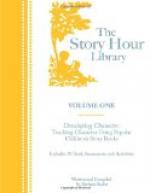It is well to remember the details with which you surrounded your story when first you told it, and hold to them strictly on all other occasions. The children allow you no latitude in this matter; they draw the line absolutely upon all change. Woe unto you, scribes and Pharisees, if you speak of Jimmy when “his name was Johnny;” or if, when you are depicting the fearful results of disobedience, you lose Jane in a cranberry bog instead of the heart of a forest! Personally you do not care much for little Jane, and it is a matter of no moment to you where you lost her; but an error such as this undermines the very foundations of the universe in the children’s minds. “Can Jane be lost in two places?” they exclaim mentally,” or are there two Janes, and are they both lost? because if so, it must be a fatality to be named Jane.”
Perez relates the following incident: “A certain child was fond of a story about a young bird, which, having left its nest, although its mother had forbidden it to do so, flew to the top of a chimney, fell down the flue into the fire, and died a victim to his disobedience. The person who told the story thought it necessary to embellish it from his own imagination. ‘That’s not right,’ said the child at the first change which was made, ‘the mother said this and did that.’ His cousin, not remembering the story word for word, was obliged to have recourse to invention to fill up gaps. But the child could not stand it. He slid down from his cousin’s knees, and with tears in his eyes, and indignant gestures, exclaimed, ’It’s not true! The little bird said, coui, coui, coui, coui, before he fell into the fire, to make his mother hear; but the mother did not hear him, and he burnt his wings, his claws, and his beak, and he died, poor little bird.’ And the child ran away, crying as if he had been beaten. He had been worse than beaten; he had been deceived, or at least he thought so; his story had been spoiled by being altered.” So seriously do children for a long time take fiction for reality.




